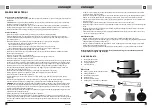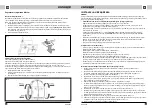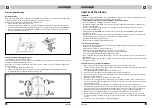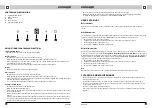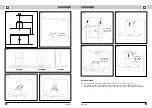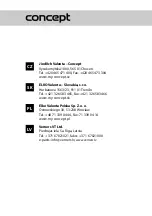
Cleaning and replacement of filters
Metal fat filters
When the appliance is in common use, the metal fat filters should be checked or cleaned every month.
In case of more frequent frying or deep frying, shorten this interval.
Do not use the appliance without the metal fat filters properly installed!
1. Remove the metal filters as shown in Fig. 1.
2. Let the metal filters soak in warm water with addition of a detergent or put them into a washer with a
cleaning agent and set temperature below
60 °C
. In case of soaking in warm water, clean the metal filters
with a fine brush, rinse them with clean water and let them dry.
3. Reinstall dried out filters.
Fig. 1
Carbon filter (to be purchased)
This filter is only used for the recirculation mode.
The filter contains an active carbon absorbing the smell being discharged. The active carbon will be saturated
after some time, hence the absorption capacity will be shortened. This filter cannot be washed or cleaned in
any other way.
When the appliance is in common use, the carbon filter should be replaced every 2-3 months. In case of more
frequent frying or deep frying, shorten this interval.
1. Remove the metal filters as shown in Fig. 1.
2. The carbon filters are situated on both sides of the motor. Turn the filters, until they are secured
(see Fig. 2).
3. To replace the carbon filter, proceed in reverse order.
Fig. 2
Closed
Opened
Opened
Closed
INSTALLATION OF THE APPLIANCE
Caution!
Risk of electric shock! Before installation, disconnect the power cord from the wall outlet. Otherwise there is a
risk of death or electric shock.
• Defects caused by improper installation are not covered by the warranty.
• Installation is the responsibility of the customer not the manufacturer.
• The manufacturer bears no responsibility for damage caused to people, animals or property due to inco-
rrect installation.
• All guards must be placed firmly in their appropriate place in a way they cannot be removed without using
special tools.
• Install the appliance at least
650 mm
over electric cookers or electric cooking plates and at least
750 mm
over gas cookers or gas cooking plates.
• Extracted air should not be led to a chimney intended for discharge of flue gases and combustion products
or a shaft serving for ventilation of rooms where fireplaces are situated.
• Any bend of the ventilation pipe should be ≥120°C.
• The room must be well ventilated during cooking.
Connection to the mains
• Make sure the mains voltage and current protection correspond to the values on the rating plate of the
appliance.
• Only use grounded sockets.
• Do not use multiple sockets, plugs and extension cords.
• The plug of the power cord on the appliance must be freely accessible even after the installation.
• Changes in a connection may only be performed by a qualified professional.
• Electrical safety of the appliance can be guaranteed only if the protective terminal of the appliance is
connected to the protective conductor of the mains.
• The manufacturer bears no responsibility for damage to persons or property as a result of missing or bad
protective connection.
When installing the appliance, follow these steps:
1. Remove all the packaging and marketing materials before first use.
2. Mark the required installation height (650 mm for electric and 750 mm for gas cooking plates) on the
wall behind the cooker or the cooking plate (Fig. 3).
3. Draw a vertical line to mark the centre of the cooking plate (of the cooker).
4. Drill holes and attach the hood bracket as shown in Fig. 4.
5. Make sure that the bracket is in the horizontal position in order to prevent grease (fat) from being accu-
mulated on one side after the hood has been hung (Fig. 5).
6. Hang the hood on the attached bracket as shown in Fig. 6.
7. After the hood has been hung, install the flexible outlet duct to the outlet opening (Fig. 7). Use a reducer
fitting 150/120 mm in diameter, if required. Insert the second part of the flexible duct in the opening
prepared in the wall.
8. Drill holes and attach the lower chimney part bracket as shown in Fig. 8.
9. Place the lower part as well as the upper part of the chimney on the hood hung (Fig. 9). Lift the upper
part up to the required height and mark holes on the wall for attachment of the upper chimney part
bracket. Subsequently remove the lower as well as the upper chimney part.
10. Drill holes and attach the upper chimney part bracket as shown in Fig. 10.
11. Place the lower as well as the upper chimney part. Lift the upper part up to the required height and
attach the upper chimney part to the upper chimney part bracket as shown in Fig. 11.
12. Plug the power cord into the wall outlet.
EN
EN
57
56
OPK 4660
OPK 4660

